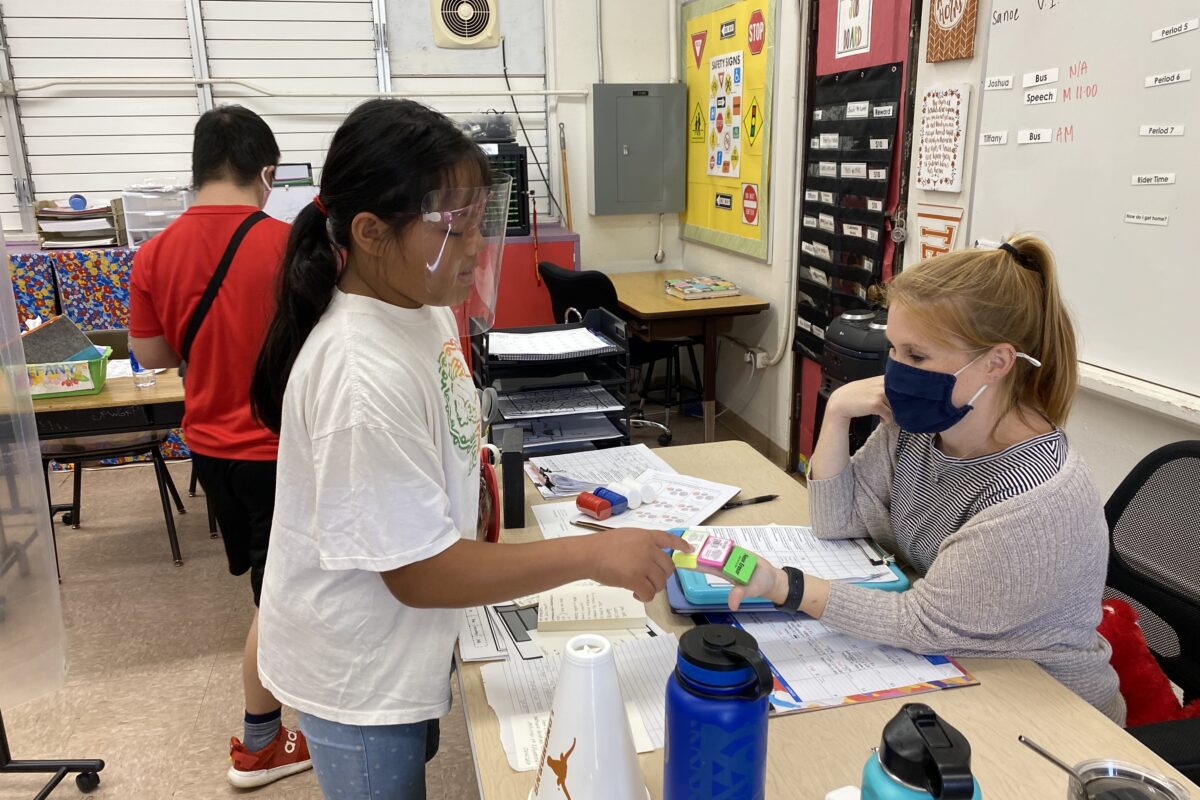Specialization in secondary special education or severe disabilities and autism
Checkmark
Stipends Available
The new Bachelor of Education in Special Education is a statewide program that leads to licensure to teach special education in Hawaii public schools. Candidates living on any island in the state of Hawaii can complete this program from their home island as the final two years of a bachelor’s degree. This program offers two specialization options to choose from:
- Secondary Special Education, Mild/Moderate (6-12) – for those looking to become special education teachers in middle or high schools.
- Severe Disabilities and Autism (PK-3, K-6, or 6-12) – this specialization prepares candidates to teach and support individuals with low-incidence disabilities who have extensive support needs (e.g. intellectual disability, Autism Spectrum Disorder, multiple disabilities).
Who should consider this program
People who:
1. Secondary Special Education, Mild/Moderate (6-12)
- Want to teach in middle or high school settings as a special education teacher, and/or
2. Severe Disabilities and Autism (PK-3, K-6, or 6-12)
- Want to teach students with severe disabilities/autism at any grade level (preschool to grade 12), often teaching in fully self-contained settings
- Want to teach in preschool special education settings
Current school personnel (e.g., educational assistants and paraprofessionals) who are working in special education classrooms may be able to fulfill a majority of field requirements while employed. Please inquire for more details.
Common Careers
Upon program completion, qualified candidates will be recommended for initial teacher licensure in either secondary special education (6-12) or in severe disabilities/autism (PK-12) to the Hawaii Teacher Standards Board. Program graduates are prepared to teach in a range of Hawaii DOE special education placements as a:
1. Secondary Special Education, Mild/Moderate (6-12)
- Secondary special education resource teacher, and/or
- Secondary special education inclusion teacher
2. Severe Disabilities and Autism (PK-3, K-6, or 6-12)
- Special education fully self-contained teacher, and/or
- Special education community-based instruction teacher, and/or
- Special education preschool teacher
Admission Requirements
Eligibility Requirements
In order to apply for this program, candidates must have completed, or be in the process of completing, the following:
- 57 credits or Associate’s Degree
- Can be from UH-Mānoa and/or approved transfer credits from another institution
- 40 Hours of Group Leadership Experience (Form) with school-aged children, preferably with students with disabilities
- UHM General Education Core and Prerequisites
Academic advisors provide individualized advising to assist with identifying which requirements have been met and provide support in registering or completing next steps. Please visit the Office of Student Academic Services website to view options for setting up an appointment.
Admission Requirements
- GPA: 2.75 or higher
- As part of the application process, candidates will need to complete a video recorded responses and timed essay, write a personal statement, and list three (3) references
- A laptop (not an ipad) is required upon admission
Note. No Praxis exams are needed for entry or graduation from this program. All candidates will have met content knowledge requirements through their extensive coursework throughout the program.
International students are unable to pursue our online or hybrid programs due to visa requirements, including those who wish to pursue online courses from their home country. We apologize for the inconvenience.
Delivery
STATEWIDE PROGRAM (online/hybrid)
Available on all islands. Cohorted program, with candidates completing the program together as a unit for each track. Courses are online with class sessions held in the early evenings, typically 4:30pm-7:00pm on weekdays. In addition, candidates will spend time in classroom settings during the day as part of their field placements each semester.
In addition, there are two face-to-face Saturday class meetings each Fall/Spring semester. Neighbor island candidates travel to Oahu and some financial support is provided to assist with travel costs associated with face-to-face program requirements.
Tuition & Funding
Approximately $471 per credit (RESIDENT; 63 credits x $471 = approximately $29,673). See: https://www.outreach.hawaii.edu/admissions-and-aid/tuition-and-fees/
DOE STIPENDS: 60 credits of resident tuition (approximately $28,260): Available to fund candidates who agree to teach as a special education teacher in a Hawaii DOE school for a minimum of 3 years after program completion.
- Upon yearly renewal of funds, this funding opportunity will automatically be offered to all admitted program candidates. The stipend is given each semester directly to the student while enrolled, therefore stipend is considered taxable and may impact financial aid award.
- Prior to accepting stipend, Non-U.S. citizens need to inquire with the Hawaii DOE to determine eligibility for employment upon graduation.
TEACH GRANT: Up to $8,000 may be available to candidates who intend to teach special education full-time at a Title I school. Candidates must qualify for financial aid and have a GPA of 3.25 or above to be eligible. (https://studentaid.gov/teach-grant-program)
SCHOLARSHIPS: Refer to http://www.star.hawaii.edu/scholarship
Coursework for Secondary (6-12), Mild/Moderate Disabilities Track
CORE Courses (3 credits each, 24 credits total):
- SPED 425 Partnerships with Families and Professionals
- SPED 480 Instructional and Assistive Technology
- SPED 485 Classroom Organization and Management
- STE 320 Instructional and Assessment Methods for Multilingual Learners
- SPED 306 Special Education Law and Policy
- SPED 310 Introduction to Special Education Assessment
- SPED 311 Introduction to Specialized Instruction
- SPED 489 Intensive Behavioral Interventions
+ Secondary Special Education Track-Specific Coursework (3 credits each, 18 credits total)
- SPED 421(e) Strategies for Reading Difficulties – Mild/Moderate Disabilities
- SPED 422 Literacy (Writing) for Secondary Students – Mild/Moderate Disabilities
- SPED 461(e) Assessment, Planning, and Instruction for Students with Mild/Moderate Disabilities
- SPED 463 Inclusive Practices Across the Curriculum – Mild/Moderate Disabilities
- SPED 455 Secondary Transition – Mild/Moderate Disabilities
- SPED 487 Characteristics/Strategies for Teaching At-Risk Students
In addition to coursework, all UHM candidates are expected to meet college-wide professional dispositions. Failure to do so may result in dismissal from program.
Coursework for PK-12 Severe Disabilities/Autism Track
CORE Courses (3 credits each, 24 credits total):
- SPED 425 Partnerships with Families and Professionals
- SPED 480 Instructional and Assistive Technology
- SPED 485 Classroom Organization and Management
- STE 320 Instructional and Assessment Methods for Multilingual Learners
- SPED 306 Special Education Law and Policy
- SPED 310 Introduction to Special Education Assessment
- SPED 311 Introduction to Specialized Instruction
- SPED 489 Intensive Behavioral Interventions
+ Severe Disabilities/Autism Track-Specific Coursework (3 credits each, 18 credits total)
- SPED 332 Children with Communication Needs
- SPED 412 Individuals with Severe Disabilities/Autism
- SPED 453 Physical and Medical Needs – Severe Disabilities/Autism
- SPED 454 Serving Non-School-Age Individuals with Severe Disabilities/Autism
- SPED 460 Introduction to Assessment and Instruction – Severe Disabilities/Autism
- SPED 462 Assessment and Instruction – Severe Disabilities/Autism
In addition to coursework, all UHM candidates are expected to meet college-wide professional dispositions. Failure to do so may result in dismissal from program.
Field Placements
Fieldwork Requirements
In addition to general coursework, each Fall/Spring semester candidates will enroll in field experience, where candidates are placed in local schools during the day to learn from a mentor teacher. The first three semesters of the program are part-time field experiences, typically requiring two or three days in the classroom, whereas the final Spring semester is a full-time (Monday-Friday, 12 total credits) student teaching experience in special education placements.
FIELD Courses (21 credits)
- SPED 400 Field Training in Special Education (3 semesters @ 3 cr each)
- SPED 390 Student Teaching in Special Education (10 cr – final semester)
- SPED 391 Seminar in Student Teaching in Special Education (2 cr – final semester)
Types of Field Placements
Traditional placements are assigned by the cohort coordinator for candidates to observe and practice in a classroom with a licensed special education teacher.
In-place placements are for those already working in school settings and employed by the DOE in special education classroom settings. All candidates who are considering using their paid position to fulfill field requirements must first obtain departmental approval, which are completed on a case-by-case basis.
Advising & Faculty
Program Info & Inquiries
Please complete the “Request More Info” form and our recruitment specialist will be happy to answer additional questions, provide more detailed information, and assist with the application process during admissions.




